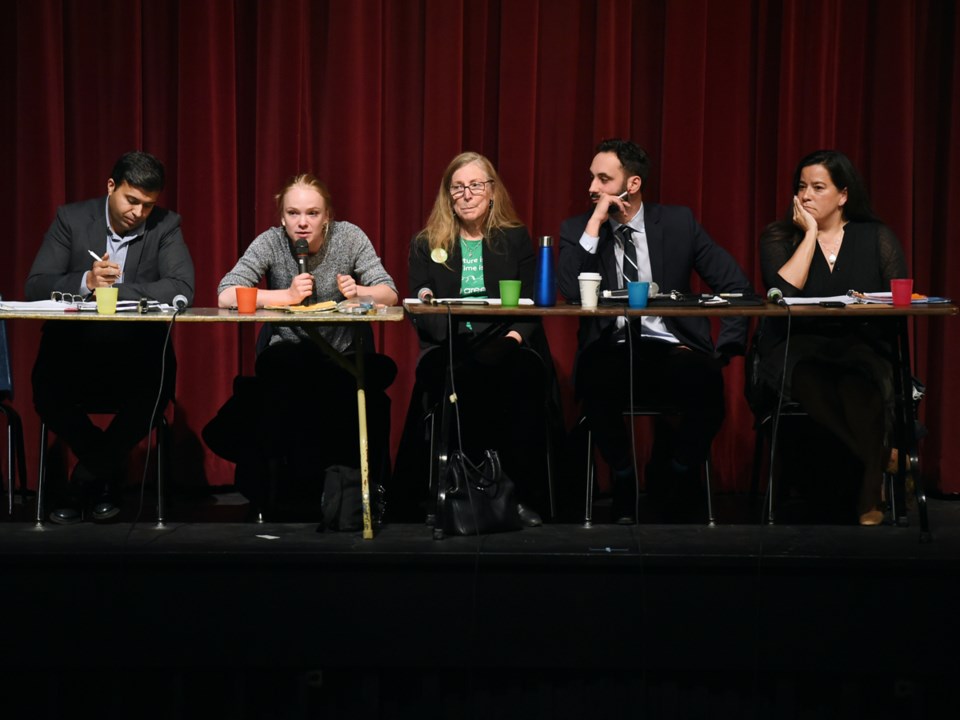Audience members never fail to spice up meetings with elected officials and would-be politicians, and Monday night went precisely according to script.
Hosted by members of Little Mountain Neighbourhood House, Monday night’s Vancouver-Granville all candidates’ meeting at Eric Hamber secondary largely featured candidates sticking to talking points they’ve clung to, in some cases, for more than four years.
Five of the six candidates attended, save for People’s Party candidate Naomi Chocyk. Those in attendance included Liberal Taleeb Noormohamed, Independent Jody Wilson-Raybould, the NDP’s Yvonne Hanson, Green Party candidate Louise Boutin and Conservative Zach Segal.
After 70 minutes of promises, pledges and the odd jab, a serious body blow came in the form of this audience question: “What do you think Canadians should think of the current prime minister’s character and leadership?”
Off came the gloves, with the lead salvo going to Hanson.
“I think he’s a trust fund frat boy who surrounds himself with people who have very specific needs that they want with him and when he fulfills those needs he feels like he’s fulfilling the needs of all Canadians,” said the NDP candidate.
Liberal candidate Noormohamed was having none of it and went directly after NDP leader Jagmeet Singh.
“I find that terribly rich coming from a party led by someone who’s played footsie with terrorists, lives in a massive house near [Toronto suburb] Parkdale and drives a very, very large black German luxury automobile,” he said.
Wilson-Raybould began her response by thanking the audience member for the question, which elicited the most laughter of the night.
She went on to suggest politicians in Ottawa are too beholden to party staffers and other insiders, rather than MPs and their constituents. She did not mention Prime Minister Justin Trudeau by name at any point.
“I can look myself in the mirror every night knowing that I did my job and I stuck with my values and principles,” she said.
Green candidate Boutin suggested paying too much attention to a leader rather than a party is too American. Conservative candidate Segal got his digs in by saying Trudeau is immature, lacks seriousness and is a laughing stock on the world stage.
The first of two audience questions was less direct, but more to the point. The five candidates were asked to define the term “housing affordability.”Ěý Most candidates responded with varying takes on the belief that no more than 30 per cent of monthly income should be spent on housing. Wilson-Raybould didn’t offer a specific number, while Boutin said that formula should be based on individual needs and circumstances.
Hanson noted that using median income in the Â鶹´«Ă˝Ół»context is a misnomer, and should instead be based on an occupant’s income.
The majority of Monday’s debate was broken into specific themes: climate change, opioids, housing affordability, Indigenous reconciliation, poverty reduction and immigration. Candidates were given 90 seconds to provide answers in front of about 75 audience members, who were by and large pro Wilson-Raybould.Ěý
Noormohamed and Segal framed many of their answers in the context of both past and present policies put forth by their respective parties. Wilson-Raybould pushed for more independent voices and collaboration across party lines in Ottawa, while Boutin focused mostly on climate change.
Hanson, 24, had by far the most detailed answers to almost every question.
On climate change, she pledged: more transit in rural areas, retraining 300,000 people working in the fossil fuel industries, an accountability office to make sure climate targets are set and met, retrofitting every building that’s unsustainable by 2050 and banning herbicides and pesticides that are harmful to the environment.
Boutin, meanwhile, promised to cancel the Trans Mountain Pipeline project, while Segal suggested the worst polluters would be forced to pay by reinvesting in clean tech industries.
Outside of climate change, every candidate said housing affordability is the most pressing issue with voters. Noormohamed, Segal and Boutin suggested the City of Â鶹´«Ă˝Ół»shoulders a large part of the blame, due to excessive delays to get housing built quickly. Hanson repeated the NDP’s pledge to build 500,000 affordable housing units across the country and Wilson-Raybould said more rental and purpose-built housing is needed.
A three-part question around opioids was telling in the non-answers provided. Candidates were asked if they endorse a government-backed, clean supply of drugs, decriminalizing possession of small amounts and how they’d bring federal attention to the issue if elected. Hanson, Boutin and Wilson-Raybould all support the call for a clean drug supply and decriminalizing possession of small amounts. Noormohamed wants more safe injection sites, but stopped short of endorsing a clean supply or decriminalization. Segal said the focus needs to be on rehab and treatment and made no mention of a clean drug supply, nor decriminalization.
On immigration, candidates were asked what level of immigration they’re comfortable supporting. No number was asked for specifically and no candidate provided one.
Everyone agreed on welcoming people into the country from across the world, though Segal couched his remarks by saying the numbers should take into account the need to fill gaps in the labour force and economy. Boutin said Canada needs to be more of a leader on the world stage so that people aren’t forced to flee their home countries to begin with.
Voting day is Oct. 21.
@JohnKurucz
Ěý



